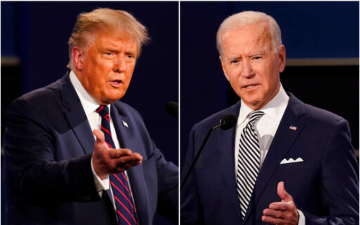
United States President, Joe Biden (right) and Former President, Donald Trump (left). Photo by Patrick Semansky/Associated Press.
John P. Pelissero is director of government ethics and Ann G. Skeet is senior director of leadership ethics at the Markkula Center for Applied Ethics of Santa Clara University. Some of the content of this essay is adapted from their book, Voting for Ethics: A Guide for U.S. Voters, 2nd ed., (co-authored with Hana S. Callaghan), to be published by Palmetto Publishing in July 2024.
Democracy benefits from open and frequent exchanges of policy views by candidates for office and voters expect debates to demonstrate the important differences in policies and leadership styles of the candidates. Our political process is born out of the ethical ideal of creating an informed electorate, a necessary ingredient of a healthy democracy.
In a surprise move, President Joe Biden and former President Donald Trump have agreed to hold two debates outside of the normal debate process that has been overseen by the Commission on Presidential Debates since 1988. We should embrace the decision to hold debates, even if the Commission is not directly sponsoring the events and there has been some hand-wringing over the candidates departing from the Commission-sponsored debates and format. It is worth noting that prior to 1988, we had presidential debates sponsored by the League of Women Voters (1976, 1980, 1984) and broadcast networks (1956, 1960). The Commission was created to ensure that debates would take place among presidential contenders and their vice-presidential running mates; that there would be multiple debates; and a variety of debate formats and moderators.
Historically, the 1858 debates between Abraham Lincoln and Stephen A. Douglas for the U.S. Senate from Illinois were the most consequential in our nation’s existence, debating the importance of maintaining the Union and the future of slavery. On each of seven dates, the candidates debated for three hours to inform the electorate of their policy and political views of the future for a nation at risk of civil war. Their debates set the stage for both the Senate election and foreshadowed the critical stakes for the 1860 presidential race. They showed why debates matter.
The first debate of this 2024 presidential election cycle is weeks before the Republican and Democratic parties are holding their nominating conventions. It will be sponsored and moderated by CNN with no live audience. This will be followed on September 10 by an ABC-sponsored debate, where it remains uncertain if there will be an audience present in the studio. Each debate will have two moderators from the sponsoring news organizations, who will be fully aware of the challenges of past debates. In 2016 and 2020 debates were anything but “normal,” with candidate Donald Trump ignoring the debate rules and decorum, which led to unexpected and unfortunate reactions from his debate opponents, Hillary Clinton (2016) and Joe Biden (2020).
There was plenty of blame to go around for the failure of the debates in those years to inform the electorate about issues and not descend into personal, rude attacks. Moderation quality was uneven. At times, live audiences interfered in the debate. Townhall formats had unanticipated questions and commentary, leading to undignified behavior on stage. And the Commission failed to make adjustments in the management of the debates to best serve to inform the electorate.
Agreeing to participate under the rules of debate is an important component of a debate process that will serve a healthy democracy. At the Markkula Center for Applied Ethics, we have promoted three key rules for ethical debate engagement that, if adopted by the candidates, would enhance the informational outcomes of the debates:
(1) Candidates should show respect for the electorate. They should provide substantive answers to the moderator’s questions; be honest, fair, and civil in all their responses; and only make promises that are consistent, capable of being achieved, and within the jurisdiction of the office being sought.
(2) Candidates should show respect for their opponents. They should criticize policies and the record of their opponents, not the opponents personally; refrain from name-calling or other insults; and not engage in irrelevant attacks against either their opponents or their opponents’ family or associates.
(3) Candidates should show respect for the debate process. They should not interrupt or shout down fellow candidates or the moderator; answer the question asked; stay within allotted time limits; and use their time to debate opponents and not to make soundbites for publicity.
These are not unreasonable standards to agree upon. The ethical standard of fairness—to the sponsors of the debate, to one’s opponents, and to the voting public—would be well represented in the process if the candidates agreed to such rules. So, too, would the common good be served by debates that elevate voters’ confidence in our ability to engage in civil discourse, restoring some of the trust the public has lost in its elected officials. Following these guidelines will demonstrate that debates do matter. And doing so, would promote the fundamental purpose of a debate to contribute to the education of an informed electorate and to the continued health of our democracy, which is so important in the 2024 election.